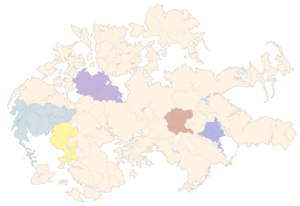G-5 major nations
| The G5 nations highlighted within the continent of Hespia | |
|---|---|

| |
The G-5 major nations, more commonly known as the G5 nations, the Group of 5, or simply the G5, refers to Sanctaria, Sciongrad, Grosseschnauzer, Bears Armed, and Laeral. These countries are considered major nations, or great powers, within the International Democratic Union. Sanctaria, Sciongrad, Grosseschnauzer, and Bears Armed have been referred to as the "Big Four" within the International Democratic Union for most of the region's existence; Laeral was invited to join the group in 2018, shortly after marking almost a year as World Assembly delegate of the region. All G5 nations are located on the continent of Hespia within the International Democratic Union.
The G5 typically involve themselves with regional security and harmony, often acting as neutral brokers for armed conflicts that break out between nations in the region, or occasionally within nations themselves.
Overview
A major nation or great power, particularly in the context of the International Democratic Union, is a sovereign state that is recognised as having the ability and expertise to exert its influence on a global scale. Great powers characteristically possess political, military and economic strength, as well as diplomatic and soft power influence, which may cause middle or small powers to consider the great powers' opinions before taking actions of their own.
As in many nations in many regions have differing opinions on what constitutes a great power, the status of great powers within the IDU was formally recognised in forums such as the G-5 major nations (G5). It is generally accepted that, to be considered a great power within the IDU, a nation must be invited to join this grouping.